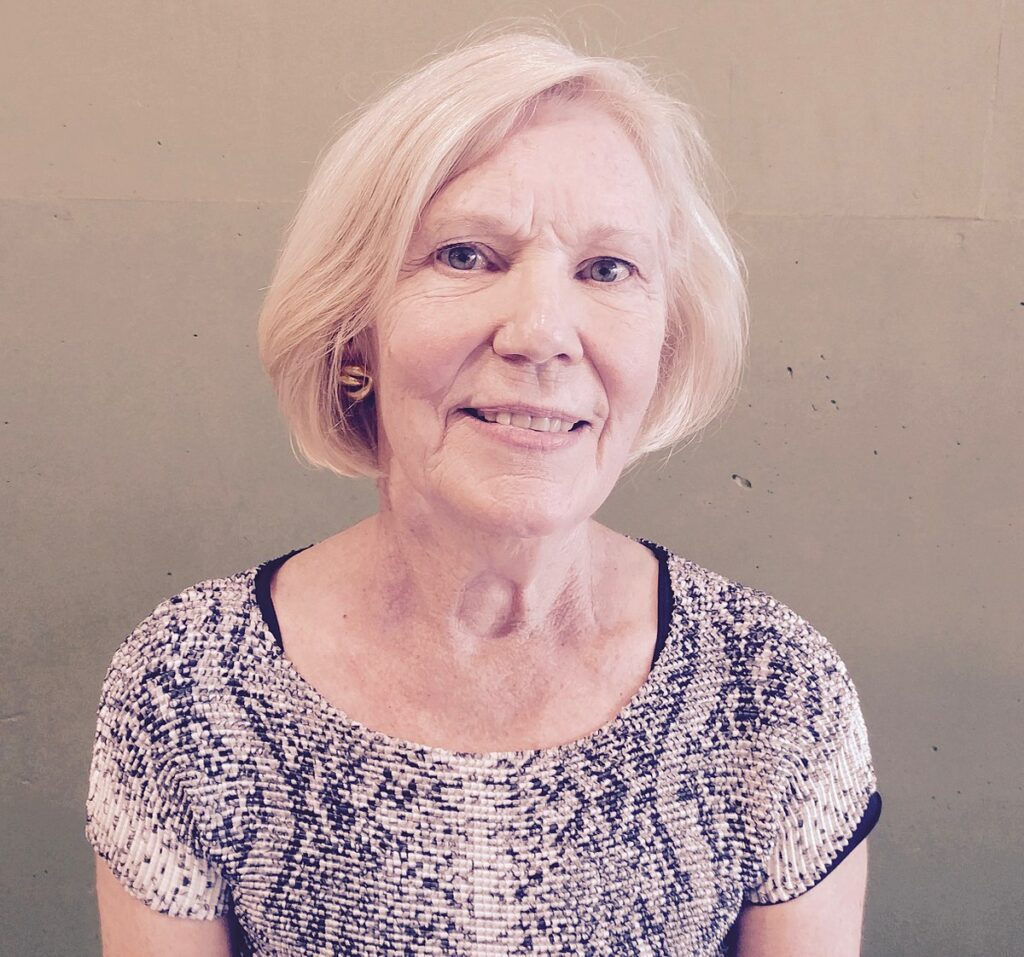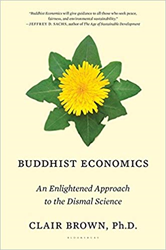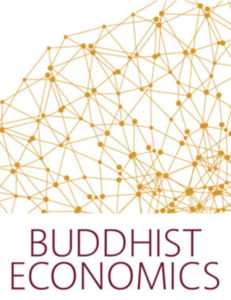
Clair Brown (Buddhist Economics)
“BUDDHIST ECONOMY: HOW TO PASS FROM SELF-CENTERED MATERIALISM TO SHARED PROSPERITY IN A SUSTAINABLE WORLD?“
Buddhist Economy: is it the economic model used by buddhist monks? Of course not…It’s the model proposed by Clair Brown, Professor of Economics and Director of the Center for Work, Technology, and Society at the University of California, Berkeley. According to Prof. Clair Brown, we are facing two major challenges: increasing inequality and ecological crisis. And these two problems are the consequence of the mainstream competitive economic model, popularly called the free market model, which pushes consumerism, selfishness, and domination of nature, leaving people suffering in a world out of balance. Buddhist economics is an alternative, that goes beyond self-centered materialism and provides a framework for an economy that delivers shared prosperity in a sustainable world where the human spirit flourishes. What are its basic principles? In whose hands does the responsibility lie for such a change? How to achieve happiness with this model and what is a compassionate economy? What are the steps to pass to the Buddhist economy model?

For further details –
https://youtu.be/88RX5A2iezs
http://buddhisteconomics.net/
INTERVIEW – (September 2018)
This interview was made in August 2018 and published in September 2018 on www.lteconomy.org
Subject: Buddhist Economics
By Dario Ruggiero, Founder of Long Term Economy
Highlights
- Our free market economic system pushes consumerism, selfishness, and domination of nature, and this leaves people suffering in a world out of balance. Buddhist economics focuses on caring for others and the earth and relieving suffering.
- In a Buddhist economy, the government provides social programs that provide health care, education, care for children and elders, and a social safety net.
- The final chapter lays out eight steps to creating a Buddhist economy, to reduce inequality, greenhouse gas emissions, and global suffering. Four steps are for governments, two for business, and two for individuals.
- In Buddhist economics, income is just one element used to measure a person’s prosperity. Consumption becomes only one aspect of a multifaceted life—helping others, contributing to your community, experiencing deep relationships with family and friends, and enjoying creative activities.
- Our awareness of interdependence makes us kind and altruistic because we realize that the well-being of others and of nature affects our own well-being.
- Buddhist economics recognizes that all people share the basic motivation of being happy. In Buddhist economics, we discriminate between real happiness built upon a fully developed mindful life, and temporary happiness built around money and never-ending desires.
- Now that we understand interdependence and what makes people happy, our goal is to create an economy that cares for people and for the planet — a compassionate economy.
- Inequality is responsible for much of today’s carbon emissions, because the carbon footprint of the rich is enormous. America’s 1-percenters emit fifteen times more greenhouse gas emissions per person than the average American does, and fifty times more than the average person worldwide.
- People in rich countries can shift their focus from wasteful, non-regenerative consumption to caring about relationships and experiences.
- You must join with others to demand that your government provide the infrastructure required for an economy that protects the environment and reduces carbon emissions, one that defines economic growth as improved well-being rather than more income.
⇓
“Our free market economic system pushes consumerism, selfishness, and
domination of nature, and this leaves people suffering in a world out of balance.
Buddhist economics focuses on caring for others and the earth and relieving
suffering”
Question 1 | Buddhist economics VS the current economic model
Our global economy faces two major economic threats—inequality and climate change—along with the political threat of war. The mainstream competitive economic model, popularly called the free market model, does not address these problems, because it incorrectly assumes that markets can take care of the problems and deliver a high standard of living to all. History has demonstrated that the free market model is not correct, as inequality and climate change have grown worse over the past four decades and threaten human existence as we know it. Wars along with climate change have decimated people’s homes and communities, and created millions of refugees seeking a safe place to live. Our free market economic system pushes consumerism, selfishness, and domination of nature, and this leaves people suffering in a world out of balance. Buddhist economics is an alternative, holistic economic model that goes beyond self-centered materialism and provides a framework for an economy that delivers shared prosperity in a sustainable world where the human spirit flourishes. Buddhist economics focuses on caring for others and the earth and relieving suffering, where our goal is maximizing well-being of all instead of maximizing consumption and income. In a Buddhist economy, the government provides social programs that provide health care, education, care for children and elders, and a social safety net, along with regulatory and tax policies that structure markets to deliver the desired outcomes. Company performance includes the well-being of workers, the community, and the environment as well as shareholders. Individuals live mindfully and care for each other and the planet.
⇓
Question 2 | The actors of Buddhist economy
Who is your book directed to (institutions, firms, consumers)?
My book is for people, companies, and governments—for anyone who cares about sustainability, inequality, and the quality of life, especially in this time of climate crises. The final chapter lays out eight steps to creating a Buddhist economy, based on policies that are already known to work to reduce inequality, greenhouse gas emissions, and global suffering. Four steps are for governments, two for business, and two for individuals. There are no silver bullets, but many different possible policies and ways to create an economy that cares for all people and the planet.
⇓
Question 3 | Ending over-consumption
“Replacing the endless cycle of desire with more positive collective activities.” This is one of the main features of your approach. Why and in which way should it be achieved?
In Buddhist economics, income is just one element used to measure a person’s prosperity. More important is how a person uses resources to create a meaningful life. What does this mean for your approach to life? No longer do you fill your closets and home with all kinds of stuff. We stop buying things we don’t need and barely use, and move from a closetful (free market) to a mindful (Buddhist) approach to life. Consumption becomes only one aspect of a multifaceted life—helping others, contributing to your community, experiencing deep relationships with family and friends, and enjoying creative activities.
“Our awareness of interdependence makes us kind and altruistic,
because we realize that the well-being of others and of nature affects our own
well-being”
Question 4 | How to create a society based on altruism
Our free market economies are structured to create enormous inequality. People feel worse off as inequality grows—families compare their economic well-being to those at the top whose incomes are growing, and they see their lifestyle falling behind in comparison. Then economic insecurity replaces what had been considered a comfortable lifestyle, and middle-class and working families feel left behind. Meanwhile the rich spend their higher incomes on status goods to mark their position. Meanwhile, globally desperate refugees flee from extreme weather, and inequality is causing social divisiveness and unrest.
Buddhist economics is based upon the interdependence of people with each other and with the environment. Our awareness of interdependence makes us kind and altruistic because we realize that the well-being of others and of nature affects our own well-being. Now you can understand the importance of the role of interdependence—it gives us the worldview that our economy should provide shared prosperity in a sustainable world.
Now we ask, “How can our society and economy support people caring for each other and for the planet?” A more equal distribution of income improves social welfare, as invidious comparisons are replaced by communal feelings of belonging and the status consumption of the rich is replaced by the basic consumption of families in need. Natural resources, including the degradation of our air, water, and forests, are used in a way that is sustainable. We understand that we are part of the earth’s ecosystems that sustain all life and that we must care for these ecosystems and ensure they are healthy. Buddhist economics guides nations to use resources wisely to improve the well-being of all people while living in harmony with nature.

“Buddhist economics recognizes that all people share the basic motivation of
being happy. In Buddhist economics, we discriminate between real happiness
built upon a fully developed mindful life, and temporary
happiness built around money and never-ending desires”
⇓
Question 5 | The role of happiness
Buddhist economics recognizes that all people share the basic motivation of being happy. In Buddhist economics, we discriminate between real happiness built upon a fully developed mindful life, and temporary happiness built around money and never-ending desires. Buddhist economics rests upon Aristotle’s eudaimonic happiness, where happiness comes from self-realization, and living a worthy and moral life in service to others and the community. Free market economics is based on hedonic happiness, or personal pleasure with the avoidance of pain, and focuses on pursuing money and buying things that make you feel good, at least in the moment. This short-lived happiness fits in well with our materialistic, goal-oriented economy.
The Dalai Lama teaches us that “genuine happiness is characterized by inner peace and arises in the context of our relationships with others.” When psychologists and neuroscientists study what makes people happy, they find that being kind to others and helping others makes people happier. Kindness makes you happier, and happier people engage in more acts of kindness.
⇓
Question 6 | An economy that take care of people…
Now that we understand interdependence and what makes people happy, our goal is to create an economy that cares for people and for the planet—a compassionate economy. Economic inequality, with the rich showing off their wealth and superiority, is based on false beliefs about what makes us happy. When we are ignorant about our interdependence and holistic happiness, we do confused and unskillful things based on misguided social conventions that glorify greed and being rich. Buddhist economics guides people to live a meaningful, happy life connected to others with compassion, and also to care for the earth. Of course we want to do this in a way that is both efficient and effective, so our goals are reached with minimum resources, time, and waste.
“People in rich countries can shift their focus from wasteful,
non-regenerative consumption to caring about relationships and experiences.”

⇓
Question 7 | The carbon footprint of the rich
Recently on your blog you have published an article entitled “Luxurious Lifestyles Are Killing the Earth.” What of the current lifestyle is particularly dangerous for our planet?
Our wasteful, extravagant lifestyle is consuming the planet’s ecological services 1.7 times faster than they can be replenished. In other words, we need 1.7 earths to provide the ecological services being consumed. We call this the ecological footprint. The high standard of living in rich countries requires many earths if all the people worldwide live this way: 5.0 earths with USA living standard; 3.0 earths for France; 2.6 earths for Italy.
Inequality is responsible for much of today’s carbon emissions because the carbon footprint of the rich is enormous. America’s 1-percenters emit fifteen times more greenhouse gas emissions per person than the average American does, and fifty times more than the average person worldwide. Yet even the typical person in a rich country creates large carbon emissions—the bottom 50% have an average carbon footprint that is four times the Paris Climate Accord goal of 2.1 tCO2e per person per year by 2050. The task to reduce the average per person CO2 for the United States, with its average of 16.5 tCO2, is much greater than the European Union with its average of 6.4 tCO2, or for Italy with its average of 5.3 tCO2 (2016 data).
People in rich countries can shift their focus from wasteful, non-regenerative consumption to caring about relationships and experiences. Companies can reduce work hours so people have more time for what is meaningful to them. When rich countries reduce their wasteful unsustainable consumption, this releases resources that can be used by people in poor economies to increase their consumption of basic goods and services in a sustainable world with shared prosperity. The health and well-being of people around the world will improve.
Question 8 | The Buddhist economics and Climate Change
In which way will the Buddhist economics help us to face Climate Change and reduce our Ecological Footprint?
⇓
Question 9 | The Buddhist economics and the youth
To the young…What will the 21st century world be like? And what should a young person do now to be a fitting person for the world that is to come?
To embrace the future and create the economy you want, you need courage—courage to change, courage to protect the environment, courage to promote justice, and courage to live with joy. At the national level, you must join with others to demand that your government provide the infrastructure required for an economy that protects the environment and reduces carbon emissions, one that defines economic growth as improved well-being rather than more income. You also need the political will and courage to take action for yourselves on behalf of all species and future generations.
“Our free market economic system pushes consumerism, selfishness, and domination of nature, and this leaves people suffering in a world out of balance. Buddhist economics focuses on caring for others and the earth and relieving suffering.”